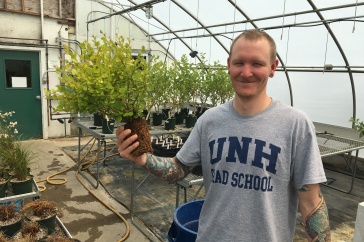
Cheryl Whistler is enchanted by her research subject, the Hawaiian bobtail squid. When she describes the petite sea creature, it’s easy to see why. 188体育app_188体育在线-平台官网 the size of a walnut, the squid can adjust tiny organs in its skin to change color. The squid are freckled, with big eyeballs, and small ?aps of skin that look like wings.
“They really are charismatic,” says Whistler, associate professor of microbiology and genetics.
But perhaps the most enchanting feature can’t be claimed by the squid alone.
Bioluminescent bacteria known as vibrio ?scheri live in an organ on the squid’s underside. These bacteria feed off nutrients provided by the squid and, in turn, protect it. The light they emit acts as camou?age, hiding the squid’s silhouette so that predators trolling the depths below can’t see the squid when they look toward the surface of the water. Instead of a delectable morsel, all they see is moonlight.?
Whistler and colleague Vaughn Cooper have won a three-year, $716,000 grant from the National Science Foundation to further research the symbiotic relationship between the bobtail squid and V. ?scheri. While this symbiotic coupling has been well studied,Whistler and Cooper will build on the current body of work to determine how nonsymbiotic strains of the bacterium develop the ability to colonize juvenile squid to create the optimal host-microbe relationship, even if they never have lived with squid before.?
“None of [the bacteria] have gotten new genetic material,” Whistler says. “They’re just playing with what they’ve got and making adjustments.”
Although most people think only of the microbes that cause disease, Whistler notes that “bene?cial bacteria are the foundation of health of all plants and animals, including humans.” Because most research has focused on disease-causing bacteria, these bene?cial associations aren’t well understood. Whistler notes that researchers and the general public are beginning to appreciate the bene?ts of certain microbes. The squid is a good ambassador of that message.
Whistler thinks the squid research will add to the broader understanding of how microbes adapt to their host. “The vast majority of microbes out there are not causing any harm and probably doing a lot of good, without any credit,” she says.
?
—Chelsea Conaboy ’04?
Originally published in?UNH Magazine—Winter?2014?Issue




















































